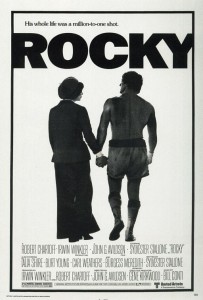Your inciting incident. You know — your story catalyst; your protagonist’s call to action / adventure.
As Robert McGee writes in his fantastic book, Story: Substance, Structure, Style and The Principles of Screenwriting:
The INCITING INCIDENT radically upsets the balance of forces in the protagonist’s life.
It’s that event or circumstance that shakes up your protagonist’s world and sets your main story in motion. It usually occurs within the first 15 pages of your script.
Can you pinpoint it in your script?
“Of course I can!” you scoff.
I know it may sound like an easy question, but apparently it’s not. I’ve read several scripts lately where an event occurred early on, that I’m sure the writer believed was the inciting incident, but was really just part of the set up.
The writers forgot one critical thing about the inciting incident. To quote McGee again:
The protagonist must react to the Inciting Incident
Let’s take Armageddon, for instance. When the first meteors destroy the Space Shuttle and strike the earth — is that the inciting incident? Nope.
What about when Truman (Billy Bob Thornton), at NASA, discovers the implications of the Texas-sized asteroid that’s flying toward the Earth? Nope.
That’s all set up.
The inciting incident occurs when the protagonist, Harry Stamper (Bruce Willis), is summoned to NASA from his oil rig. That’s when his world changes.
Isn’t this all just a bunch of dirty rotten semantics?
Who cares what you call it, as long as it’s in there somewhere, right?
Wrong.
The problem is that your first audience (i.e. the script reader) expects it early in the script. Back when 120 page scripts were standard, the inciting incident was expected by page 15. These days page 12 is typical, and there are many producers and execs that now expect it by page 10!
In reality, it’s not about the specific page count. But page counts do coincide with the leeway those reading your script are typically willing to give you.
The reality is, if your inciting incident doesn’t occur until page 30 (like Rocky), you had better have some terrifically entertaining stuff to read while we wait until then. In Rocky, we have the romance between Adrian (Talia Shire) and Rocky (Sylvester Stallone) to tide us over until Rocky gets his big shot at fighting the champ.
Note: This movie is a RARE example. In today’s market, if you put your inciting incident on page 30, your script will likely go down for the count.
That’s why it’s important to know your inciting incident
If you think you’ve given it to the reader on page 12 (e.g. the scary new crime boss comes to town), but it really doesn’t happen until page 25 (when the crime boss’s son kills the protagonist’s grandma at the Circle K) you may be scriptwrecked.
Make sure you know your true inciting incident. The further out it’s located from page 12, the more challenging it becomes to hold and engage your reader. And that’s what it’s really all about at this stage.







[url=http://www.pradabagshabayi.com/]プラダ バッグ[/url]
[url=http://www.newbalancesalehot.com/]ニューバランス シューズ[/url]
[url=http://www.coachbagsjpok.com/]コーチバッグ新作[/url]